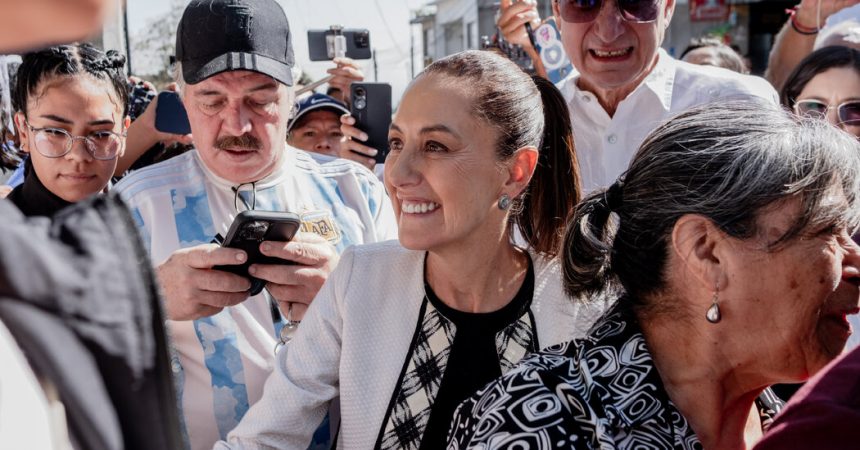Claudia Sheinbaum’s list of accolades is long: She has a Ph.D in energy engineering, participated in a United Nations panel of climate scientists awarded a Nobel Peace Prize and governed the capital, one of the largest cities in the hemisphere.
On Sunday, she added another achievement to her résumé: becoming the first woman elected president of Mexico.
Ms. Sheinbaum, 61, captured at least 58 percent of the vote in a landmark election on Sunday that featured two women competing for the nation’s highest office — a groundbreaking contest in a country long known for a culture of machismo and rampant violence against women.
Now that she has clinched the presidency, Ms. Sheinbaum’s next hurdle will be stepping out of the shadow of her predecessor and longtime mentor, Andrés Manuel López Obrador, the outgoing president.
She and Mr. López Obrador are “different people,” she said in an interview. He’s an oilman who invested in environmentally questionable projects; she’s a climate scientist. Yet Ms. Sheinbaum has appealed to voters mainly by promising to cement his legacy, backing moves like his big bet on the national oil company and proposed constitutional changes that critics call antidemocratic.
Their alliance has also left many Mexicans asking: Can Ms. Sheinbaum be her own leader? Or will she just be his pawn?
“There’s this idea, because a lot of columnists say it, that I don’t have a personality,” Ms. Sheinbaum complained to reporters earlier this year. “That President Andrés Manuel López Obrador tells me what to do.”
She insists she will govern independently from Mr. López Obrador and has some different priorities. But veering too far from his agenda could be very risky.
Here are five things to know about the newly elected president of Mexico that help inform whether she will stray from Mr. López Obrador’s policies or dedicate herself to cementing his legacy.
1. Sheinbaum will inherit a host of challenges.
A former ballet dancer, Ms. Sheinbaum calls herself “obsessive” and “disciplined.” But discipline may not be enough, analysts say.
As president, she already stands to inherit a long list of troubles. The state-owned oil company is buckling under debt, migration through the country has reached historical highs and cartel violence continues to torment the country.
She has said she would continue Mr. López Obrador’s policy of addressing the drivers of violence instead of waging war on the criminal groups, but will also work to lower rates of impunity and build up the national guard.
With a U.S. presidential election just months away, she told The New York Times that she was prepared to work with whichever candidate wins. Publicly, she has echoed Mr. López Obrador’s emphasis on tackling migration by addressing its root causes.
In a hint of potential change, she said in a recent debate that she would seek to reform the country’s migration authority, an agency often accused of corruption.
2. She’s seen as reserved, even aloof.
The Times spoke with two dozen people who have worked with or know Ms. Sheinbaum and also visited campaign events, reviewed her writings and her media appearances and interviewed her, once in 2020 and again this year.
What became clear is that Ms. Sheinbaum, (pronounced SHANE-balm), has long seemed more comfortable quietly getting things done than selling herself or her achievements.
The granddaughter of Jewish immigrants who fled Europe, she rarely discusses being Jewish or almost anything about her personal life, colleagues say. When interviewers ask her about the Nobel Prize she shared with a panel of climate researchers, she notes how many others were involved in the work.
She is known as a tough boss with a quick temper who can inspire in her staff fear and adoration at the same time. Publicly, though, her affect is so controlled it verges on aloof.
Some say her professorial demeanor could pose a challenge in a political landscape defined by Mr. López Obrador, who built his party into a juggernaut by relying on the force of his personality.
“She needs him,” said Carlos Heredia, a Mexican political analyst. “She doesn’t have the charisma, she doesn’t have the popularity, she doesn’t have the political stamina of her own, so she needs to borrow that from López Obrador.”
For some Mexicans, however, a thrills-free woman may be an ideal antidote to an entertaining man who plunged the country into partisan turmoil.
3. She’s long sought to keep Mr. López Obrador happy.
The candidate’s political career began when Mr. López Obrador was elected mayor of Mexico City in 2000 and invited her to a meeting at a diner. “What I want is to reduce pollution,” she recalled Mr. López Obrador telling her. “Do you know how to do that?”
Ms. Sheinbaum, who by then had written more than a dozen reports on energy use and carbon emissions, said yes. She became his environment minister. In meetings, she seemed willing to do almost anything to make her boss happy, according to several people who worked with her.
“The phrase she used over and over again was ‘The mayor said to,’” said Mr. Heredia, who worked with her in city government under Mr. López Obrador. What that meant, according to Mr. Heredia: “We are not a cabinet for giving ideas,” he said. “We are a group of people here to execute what he decides.”
In the years that followed, Ms. Sheinbaum straddled academia and politics, but she always stayed close to Mr. López Obrador. When he founded his Morena party in 2014, he asked her to run on the party’s ticket to become mayor of Tlalpan, a borough of Mexico City. With his backing, she won.
4. She is known for being a demanding boss.
In 2018, Mr. López Obrador was swept into the presidency in a landslide and Ms. Sheinbaum became Mexico City’s mayor. She quickly gained a reputation as an exacting boss.
“One doesn’t go to her meetings to tell her, ‘I’m working on it,’” said Soledad Aragón, a former member of Ms. Sheinbaum’s cabinet. When she walked into a room, Ms. Aragón said, everyone sat up straight.
As mayor, she could remember specific numbers mentioned in a meeting weeks after it occurred, Ms. Aragón said, calling her “brilliant” and “demanding,” especially of herself, adding: “It has gotten results.”
Five officials who have worked with Ms. Sheinbaum, who were not authorized to speak publicly, said that she was quick to anger at times and would yell at her subordinates in front of large groups. Through a spokesman, Ms. Sheinbaum declined to comment on the accusation.
Her defenders say some people merely reacted badly to a woman in charge.
“I know that in her government, sometimes people got offended or felt bad because she yelled at them,” said Marta Lamas, a longtime feminist activist who has been close to Ms. Sheinbaum and her team. “But if a man yells, it wouldn’t be an issue because culturally, it’s different.”
“People say it in a critical way: ‘She’s tough,’” Ms. Aragón said. “What do you want, someone soft in charge of the city?”
5. She is a true believer in Mr. López Obrador’s vision.
For years, Ms. Sheinbaum has tried to explain how she can be so in step with Mr. López Obrador while also being herself. The answer, she says, is simple: She genuinely believes in him.
In 2022, a radio host asked her a pointed question from a female listener: “Why don’t you choose to be a woman who governs with her own ideas? Why don’t you get out of AMLO’s circus?” she asked, using Mr. López Obrador’s nickname. “Why have the same rhetoric with the same words?”
Ms. Sheinbaum didn’t hesitate.
“If you think the same as another person, it’s not that you’re copying them; you just agree with the ideas,” she said. “You can’t deny what you believe.”
Emiliano Rodríguez Mega contributed reporting.







